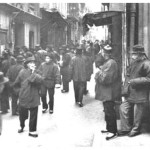我的故事 ~ 10. 一个人的党
1998年,珀斯,朋友聚会。
珀斯中国领事馆首任总领事要回国了,谈论中都有些舍不得。总领事颇具亲民之风,给人的印象是几乎跟每个华人都熟悉。但凡做人做戏做官,玩股票玩收藏玩政治,到了这种让人惦念的份上就是人尖儿了,那年还是一个澳大利亚全国大选年。谁说华人对政治不感兴趣?我认识的圈子对投票还是上心的。甭管选谁,投票日必到场。澳洲的规矩,不投票是要罚款的。虽说不多,没挣着的钱咱不奢望。可进了口袋的银子,没必要再拿出来吧?
聚会结束驾车回家,无意中听到ABC电台采访,一个叫Ed 的华人要成立一个政党参加大选。当时采访就在他家,后院立了抗议种族主义的标语牌。他说当初买地盖房时,因为他一张亚洲面孔,每天都有人往院子扔石头、砸东西。报警察也不管。知道是谁干的,但警察说法律上要抓现行才行,捉贼捉赃,懂不懂?一整年的骚扰,害怕得不行,烦得不行,可遭罪了。所以下决心把党建起来,提高华人声音。这人真够胆儿。不说古往今来,这就是澳洲历史上没有过的事儿,爷们儿!血性!有机会一定要拜见一下高人。见不着咱也投他一票!不曾想才没过两天,有人就介绍我认识了Ed 。
见面是在Ed 家,不少人呢。一番寒暄,才发现珀斯各大学的讲师教授就有好几位,中国的、东南亚华人、 印度的都有。我后来发现,这些人一个个都是智囊。Ed即黄先生。这天大家来是要讨论成立团结党参加全国大选的事儿。黄先生的名言是“一个人说话没人听,一个党说话就有人听了。”从此我无意中卷入一场政治选举,见证了澳洲历史上最大的华人参政潮。
那年澳洲政坛出了一件邪乎事儿。
一个新当选的联邦众议院议员汉森公开发表反亚裔,反土著和反移民言论。一时间成了某些极右翼者眼中的英雄。汉森小人得志成立了“一族党”。叫嚣要亚洲人滚出去。更猖狂的甚至要土著人“滚回他们来的地方”。这澳洲大陆本来就是人家土著人的,该谁滚呀?为了拉选票,一族党公布所谓“零移民”方案,主张将所有在澳洲的各种难民五年内全部遣返回国,并呼吁政府取消多元文化政策,强制移民英语考试,严格控制移民年迈双亲入境。霍华德执政的自由党对一族党态度暧昧,基本上不反对,因为汉森原来就是自由党分化出来的右翼分子。一族党的猖獗成了华人参政的主要原因。应了那句俗话:兔子急了也踹鹰。东部的悉尼有个侨领率先成立了一个政党,取名团结党。黄先生与东部取得联系,决定也成立西澳的团结党,参加当年竞选。
这黄先生原来经营一个邮局代理多年,夫妻店,认识不少人。最近刚退休,将店卖了。他当过多年邮政行业的协会主席,代表行业进行过各种谈判。比如争取公平竞争环境,跟政府讨价还价等等,积累了不少“参政”经验。黄先生说成立一个政党参选需要两个基本条件。首先要有党章 (constitution),东部的团结党已经有了,拿来改改就行。其次起码要有500个党员,这也不难。关键的是要提名候选人,分参议院候选人和众议院候选人。
首先是参议院(the Senate)候选人。当时统计珀斯华人不多,所以光华人不行,还要联系其他亚裔组织,土著更是盟友。一番讨论,四方联系,提名的是Ted Wilkes 。他是土著人,当选过年度人物,有代表性,也有号召力。团结党只要拿到4%的选票,就可以有一名参议院议员,任期六年。 Read more
My Story ~ 11. Start From Simplicity
 “We started from scratch, no language, no jobs and no money, but we didn’t give up and continued working, step by step until we achieved today’s success. It is a heavy burden that we, the first-generation of immigrants have to carry.”
“We started from scratch, no language, no jobs and no money, but we didn’t give up and continued working, step by step until we achieved today’s success. It is a heavy burden that we, the first-generation of immigrants have to carry.”
I was born in Shandong but my hometown is Fujian. I have two brothers and three sisters. It was very interesting that we six siblings were born in six different places, we followed our Father’s working place which changed frequently; the place where our father worked would be a birth place for one of us. My hometown is Guantou Town, Lianjiang County of Fujian Province, one of the overseas Chinese hometowns in China. There are several hometowns of overseas Chinese in Fujian Province, such as, Meihua District, Mawei District and Tingjiang Town in Changle. Guantou Town is next to Tingjiang Town, which had become a hometown for overseas Chinese when I was a little boy. At that time, almost all the people who lived in these towns went overseas and lived outside China. Before I went overseas, my eldest brother went to the United States with my sister-in-law; my youngest sister went to study in Japan, and I went to the United States two years after that. Soon after I went abroad, my second sister also went to the United States with my brother-in-law.
At that time, going abroad had become a trend. People began to seek opportunities by going overseas once their children became eighteen years old. People from rural areas wanted to send their children abroad for a better life, they didn’t have any other ambition or desire to remain in the countryside. At that time, people knew that America had tall spectacular houses and buildings. US dollars were much more valuable than the Chinese RMB; the monthly salary in China at that time was only a few dozen yuan, while working in a restaurant in American for one month, one could earn about two thousand US dollars, converting that to RMB yuan, it was more than ten thousand yuan. There was a great disparity between the two currencies! As a result, many people and their children left their hometown and emigrated to other countries. Many years later, these overseas Chinese had grown old and become wealthy, their children and grand children had grown up, but they had a feeling of homesickness. They wanted to revisit or return to their hometown and brought with them donations and contributions. This is a very common thing for many older overseas Chinese to do.
My hometown Guantou was such a place during those years, all the young people went abroad to earn money. Nowadays the situation is very different. The wages in the United States are still the same, but China has undergone enormous changes. Running a business or working in other industries in China, a person can earn as much as in the United States. With China’s opening up, people’s attitudes have changed with each passing day. They go abroad to have a look and return home with new ideas and the ability to do a better job at home. Although most of my family members are still overseas, some living in the US, and some living in Japan, I came to Australia and became an overseas Chinese in Australia. Read more
我的故事 ~ 11. 从最简单开始
 “我们从语言不通、一无所有慢慢努力,一步步打拼到现在,这是我们第一代移民必须要承担的艰辛……”
“我们从语言不通、一无所有慢慢努力,一步步打拼到现在,这是我们第一代移民必须要承担的艰辛……”
我是在山东出生的福建人,家里三兄弟三姐妹,六个孩子。说来有趣,我们家兄弟都是在不同的地方出生的父亲当时工作的地点就是我们出生的地方。我的老家在福建省连江县琯头镇,是主要的几个侨乡之一。福建省有几个侨乡,比如说长乐的梅花,马尾区,亭江镇。琯头镇和亭江镇紧挨在一起,我很小的时候这儿就是侨乡了,几乎所有的同乡之人都住在海外。在我之前,我的大哥追随大嫂远涉重洋去了美国,我的小妹去日本留学,大概两年后也转到美国去了。后来我二妹随我妹夫也去了美国。
那时出国打拼已经成为一种潮流,孩子一到十八岁都开始想办法往外面走。乡村人没有什么崇高的觉悟,出国就是为了淘金,好让家人过上更好的日子。那时候,美国客的房子盖得又高又壮观,美元对人民币的汇率很高,国内月薪才几十块,而在美国餐馆打工月薪两千美元左右,折合过来近一万块,对比太悬殊了!这样一来许多人的后代都移民国外了。再到后来,等到家族在外做强做大,许多平民百姓走出来的人开始怀念祖国,怀念故土,思乡情结油然而生,想要为家乡做贡献了。这是很多老华侨容易去做的事情。
之前我的老家琯头就是这样一个地方,年轻人全部都走出去打拼了。但现在情况发生了改变,在美国,工资还是老样子,国内却发生了翻天覆地的变化。在国内做生意或者做其他的行业,不会比在美国差。国门打开之后,人们的观念也日新月异地不断变化,大家真正到外面看过后就知道什么形势了。虽然我的亲朋好友有去美国的,有去日本的,我却来到了澳大利亚,成为了一名澳洲客。
我曾经在上海基地后勤部当汽车兵。从上海回到福建,我被分配到供销部门做司机。伴着改革开放的春风,供销部门当时也想走出去。因为对上海比较熟悉,我就带着琯头供销社主任和县供销社主任两个人去上海开拓业务。走了一趟上海以后,两个主任对我比较赏识,觉得我做驾驶员有点可惜,应该出来做管理人员。县供销社主任对我说,县供销社准备在上海办一个驻上海办事处,因为他看重我在上海的经历,就任命我去当办事处主任。一夜之间,我就从一个普普通通的司机进入了上海做了办事处主任。我非常喜欢这种充满挑战的生活,但是有人不理解。驾驶员当时的待遇非常好,工资又高,而且有外快,手上从来不缺零钱。你出车一趟给别人的东西带回来,别人就给你十块报酬。当时来说十块二十块是很多的钱了,多到你永远都用不完的感觉。可是对于一个人的发展前景来说,当司机就不太好了。去上海没多久,我最小的妹妹高中毕业,没有考上入大学。那时候考大学真是千军万马过独木桥,非常困难。因为考虑出路的问题,正好赶上了出国热潮。我当时澳门一个朋友的儿子就在日本读书,勤工俭学。我一想还不错,就把两个妹妹送去了日本。这样一来,很多亲朋好友都来找我帮忙。我开始更多地去了解美国、澳大利亚这些国家,在当时的出国热潮中,我的中央歌舞团的几个朋友去了澳大利亚,他们希望我也过去。出国就要辞职,可是领导不同意,让我停薪留职。领导说让我出去闯荡一番,如果不行的话还可以给我留个职位。我当时三十出头的年纪,在国内混的有模有样,有自己的司机,各方面关系都非常好,经济基础也非常好。但是以我的性格,好马不吃回头草,一旦出去就不可能再回头。 Read more
My Story ~ 12. An Ordinary Road
 “Go forward, never look back – travelling on an ordinary road is my way.”
“Go forward, never look back – travelling on an ordinary road is my way.”
I still remember that night I picked up my wife after work, but we didn’t say a word. When we came to a corner my wife suddenly held me and burst into tears. She said:” I hate you! I have never washed so many bowls in my life time in one tonight!” I took her hands, and rubbed and stroked several strands of her messy hair, smiled embarrassedly and said: Whoops! How many bowls my wife’s tender hands have washed and they have become rough! From now on, I will wash all the bowls at home.” My wife stopped crying and started to laugh.
Since coming to Australia that was the first time she went out to work – someone introduced her to wash bowls in a restaurant. Before coming here, she had done chemical laboratory analysis in the domestic cement plant. Although she was not a white-collar worker, the life of sitting in an office was comfortable and leisurely. Since she had never suffered such a hardship, all night washing bowls roughened her hands. At that time we didn’t have a car, and I still remember the second-hand bicycle I pushed that night. Except for the bell ring, the creaking noise when pushing the bicycle if was a silent, quiet road. That night the wind was howling and it kept on howling in my heart.
The road is just like this, and I must go forward.
I still remember that year my daughter came to Australia, she was only a child, who knew nothing about the world. Just because I was here she clamoured to follow and always said: “I will go anywhere my father stays.” But she didn’t know how much strength she would need if she wanted to obtain a foothold in a strange land. Suddenly she became a young adult, had part-time jobs and finished her school courses. No one told her the reasons but she knew that if she wanted to stay here, she must possess a capable identity and most important of all was language ability. So she applied for TAFE (Australia Technical and Further Education) in a language school and studied for two years. She learned language very well and got an associate degree. Hardworking and thrifty child as she was, she never asked us for extra money except for tuition. She said: “Look, father, I settled by myself.”
That was July, 2006. My daughter was only eighteen and had just graduated from high school. At that age she was supposed to enjoy a beautiful life but she had to shoulder important tasks for the whole family. In fact, she not only settled herself but also the whole family. Relying on our daughter, my whole family got the right of permanent residence. And slowly, we started to get used to living relying on our daughter: she was our family’s “ambassador” when we went to the bank or visited a doctor. My wife and I were both ordinary working-class people in China with a junior high school diploma and we didn’t learn any foreign language at that time. Once I drove home after work, and midway I was stopped by the police. I was scared and didn’t know exactly what mistake I had made. I guessed hard and thought maybe I was driving too slowly on the expressway. At the same time, two workmates were also sitting in the car but they didn’t know English either. The police said lots of words but we didn’t understand anything. We dared not to look at the police but only showed the driving license to them. Maybe they realized that I didn’t know English, so they helped me switch on the car lights and let me go. Without the company of my daughter, I didn’t know how to continue walking on the road we had chosen. Read more
我的故事 ~ 12. 平凡之路
记得那个夜晚,我去接妻子下班,一路上两个人双双无语。当走到一个拐角,妻子突然一把抱住我,失声恸哭起来,并责怪道:“我恨死你了。今天一个晚上,我把一辈子的碗都洗了!” 我拉起妻子的双手,搓了搓,捋起她凌乱的几缕头发,难看地笑着说:“哎呦!一辈子的碗呀,我老婆细嫩的双手都变粗糙了!以后咱家所有的碗都由我来洗……”妻子破涕而笑。
那是妻子来澳洲后第一次出去干活,别人介绍她去餐馆洗碗。在来澳之前,她一直在国内的水泥厂做化验分析,虽然不是白领,但坐的是办公室,日子倒也清闲。妻子从来没有受过这样的苦,一个晚上的碗,简直快洗皱了她的手。那时的我们还没有汽车,我仍记得当时推的那辆二手旧自行车的模样,真是除去铃铛不响,转起来吱吱嘎嘎,在寂静的小路上那响声特别地刺耳。那天夜里的风呼呼地刮,不停地在我心里呼啸着。
就这样一条路,也必须要往前走。
我还记得那年女儿刚过来的时候,她还是个孩子,什么都不知晓的年纪。也就是因为我在这里,她便也嚷着要跟过来,总说,“爸爸在哪里,我也要在哪里。”她哪儿知道,要在这个陌生的土地上立足,是要费多少力气。她一下子就变得跟个小大人似的,自己打零工,自己读完了书。没有人告诉她,她却自己明白了这个道理,那就是,要在这里留下来必须得有个像样的身份,语言能力是最重要的。于是,她报了语言学校,在TAFE(澳大利亚技术与继续教育学院) 读了两年,愣是把语言这关自己给琢磨透了,并得到了个大专文凭。她真算是个勤俭的孩子,除了学费,她从来不问我们要一分钱。她说:“爸,你看,我把自己给解决啦!”
那是2006年7月,女儿才18岁,刚刚高中毕业。本该是无忧无虑享受生活的光景,却已早早肩负起整个家的重任。其实,她不仅解决了自己,还解决了整个家的出路。依靠着女儿,我们一家都拿到了永久居住权,我们也慢慢地开始习惯依赖女儿生活,去银行,去看病,女儿就是我们一家的“对外大使”。我和妻子在国内都是普通工人阶层,初中文凭,没读过外语。记得一次我下班开车回家,中途被警察拦下,自己被吓得我心惊肉跳,不知到底犯了什么错,使劲想,可能在高速公路我的车速开太慢了?当时车里还有两个工友,大家都不怎么懂英文,警察平静地说了一串话,我们都大眼瞪小眼,也不敢抬头正视警官,只是把驾照递过去,警察可能意识到我不懂英文,便帮我打开车灯,放我走了。假如没有女儿的陪伴,我想,我们的路真不知道该怎么走。 Read more
My Story ~ 13. While Travelling Life’s Journey, Cherish Every Step And Every Stop Along The Way
 “Live your life, enjoy every moment and appreciate every beautiful view, either in China or in Australia.”
“Live your life, enjoy every moment and appreciate every beautiful view, either in China or in Australia.”
The long rainy season arrives again in Perth, bringing with it a gloomy air. In retrospect, everything that has happened after we moved to Australia appears in my mind. Having gone through so many things, the people that we have met along the way is becoming increasingly clear to me.
Everything was so strange when we first came to Perth and for a long time we didn’t have any sense of belonging to this place. Though we lived here, it seemed to be a distant place and we didn’t belong here. Then one afternoon when I was driving through the campus of University of Western Australia with no one on the road, it began to rain and the trees on both sides of the road were green and luxurious with Swan Lake revealing her beauty in the distance. All of a sudden, something deep in my memory was prompted and I recalled that everything seemed so familiar that it was as if I were in my hometown. I could feel a deep and sentimental mood and felt a hand grasping the softest part of my heart. I realized that I should no longer treat myself as an outsider but should try to observe and feel everything here. Life never lacks beauty, but the eyes need to open if you are to see it.
I was born in Xinjiang in the winter of 1965. Though there were already two brothers and one sister in my family, I was never spoiled like the youngest child is in many families. According to my parents, life at that time was not easy and it was extremely hard to raise such a big family. In my hometown, men were in charge of providing for the home and women did household chores. My grandfather told my mom that: “Family only exists on the basis of the country. So your man works outside of the family for the country and you should be at home to support.” My mom was quite young then and was educated with revolutionary thoughts. She would never be restrained by family duties and went to work in the hospital of our county. She was young and driven by her heart. So I was entrusted to the care of my nanny. When she came to see me, she found that I was starving and eager to eat anything given to me, which touched her so she finally took me home.
Mom told me that I was entrusted to two aunts until she resettled with my father after he was transferred to civilian work after the army service. They returned to Beijing in 1970 and cousins from my aunts sent me to Beijing to be with my parents. I was five at that time. Read more



